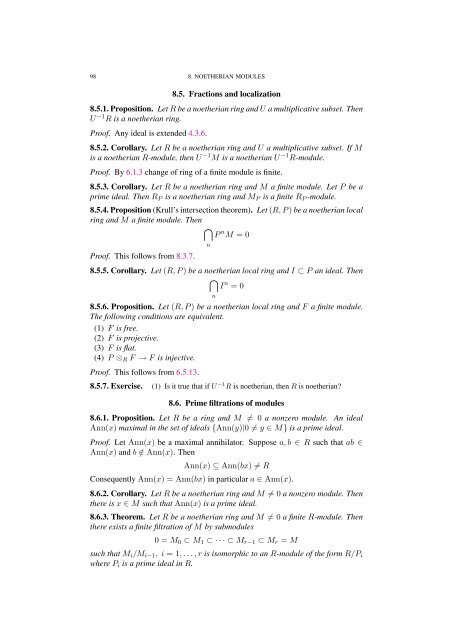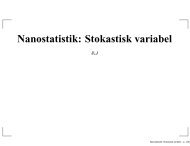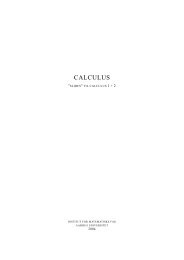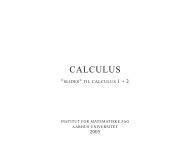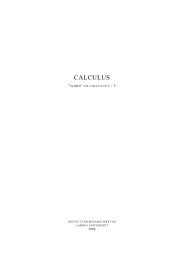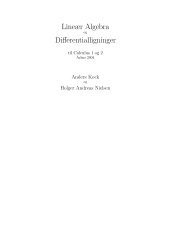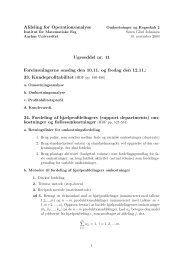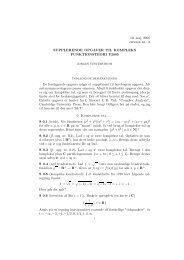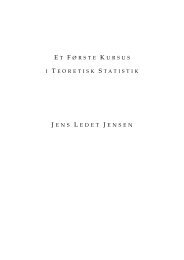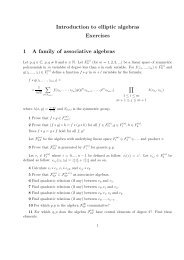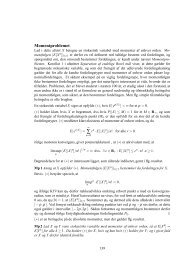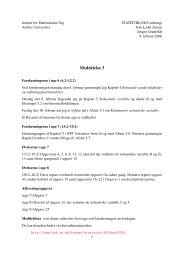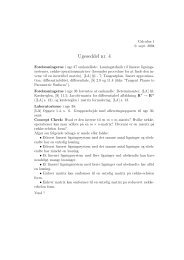Commutative algebra - Department of Mathematical Sciences - old ...
Commutative algebra - Department of Mathematical Sciences - old ...
Commutative algebra - Department of Mathematical Sciences - old ...
You also want an ePaper? Increase the reach of your titles
YUMPU automatically turns print PDFs into web optimized ePapers that Google loves.
98 8. NOETHERIAN MODULES<br />
8.5. Fractions and localization<br />
8.5.1. Proposition. Let R be a noetherian ring and U a multiplicative subset. Then<br />
U −1 R is a noetherian ring.<br />
Pro<strong>of</strong>. Any ideal is extended 4.3.6.<br />
8.5.2. Corollary. Let R be a noetherian ring and U a multiplicative subset. If M<br />
is a noetherian R-module, then U −1 M is a noetherian U −1 R-module.<br />
Pro<strong>of</strong>. By 6.1.3 change <strong>of</strong> ring <strong>of</strong> a finite module is finite.<br />
8.5.3. Corollary. Let R be a noetherian ring and M a finite module. Let P be a<br />
prime ideal. Then RP is a noetherian ring and MP is a finite RP -module.<br />
8.5.4. Proposition (Krull’s intersection theorem). Let (R, P ) be a noetherian local<br />
ring and M a finite module. Then<br />
<br />
P n M = 0<br />
Pro<strong>of</strong>. This follows from 8.3.7.<br />
n<br />
8.5.5. Corollary. Let (R, P ) be a noetherian local ring and I ⊂ P an ideal. Then<br />
<br />
I n = 0<br />
n<br />
8.5.6. Proposition. Let (R, P ) be a noetherian local ring and F a finite module.<br />
The following conditions are equivalent.<br />
(1) F is free.<br />
(2) F is projective.<br />
(3) F is flat.<br />
(4) P ⊗R F → F is injective.<br />
Pro<strong>of</strong>. This follows from 6.5.13.<br />
8.5.7. Exercise. (1) Is it true that if U −1 R is noetherian, then R is noetherian?<br />
8.6. Prime filtrations <strong>of</strong> modules<br />
8.6.1. Proposition. Let R be a ring and M = 0 a nonzero module. An ideal<br />
Ann(x) maximal in the set <strong>of</strong> ideals {Ann(y)|0 = y ∈ M} is a prime ideal.<br />
Pro<strong>of</strong>. Let Ann(x) be a maximal annihilator. Suppose a, b ∈ R such that ab ∈<br />
Ann(x) and b /∈ Ann(x). Then<br />
Ann(x) ⊆ Ann(bx) = R<br />
Consequently Ann(x) = Ann(bx) in particular a ∈ Ann(x).<br />
8.6.2. Corollary. Let R be a noetherian ring and M = 0 a nonzero module. Then<br />
there is x ∈ M such that Ann(x) is a prime ideal.<br />
8.6.3. Theorem. Let R be a noetherian ring and M = 0 a finite R-module. Then<br />
there exists a finite filtration <strong>of</strong> M by submodules<br />
0 = M0 ⊂ M1 ⊂ · · · ⊂ Mr−1 ⊂ Mr = M<br />
such that Mi/Mi−1, i = 1, . . . , r is isomorphic to an R-module <strong>of</strong> the form R/Pi<br />
where Pi is a prime ideal in R.


